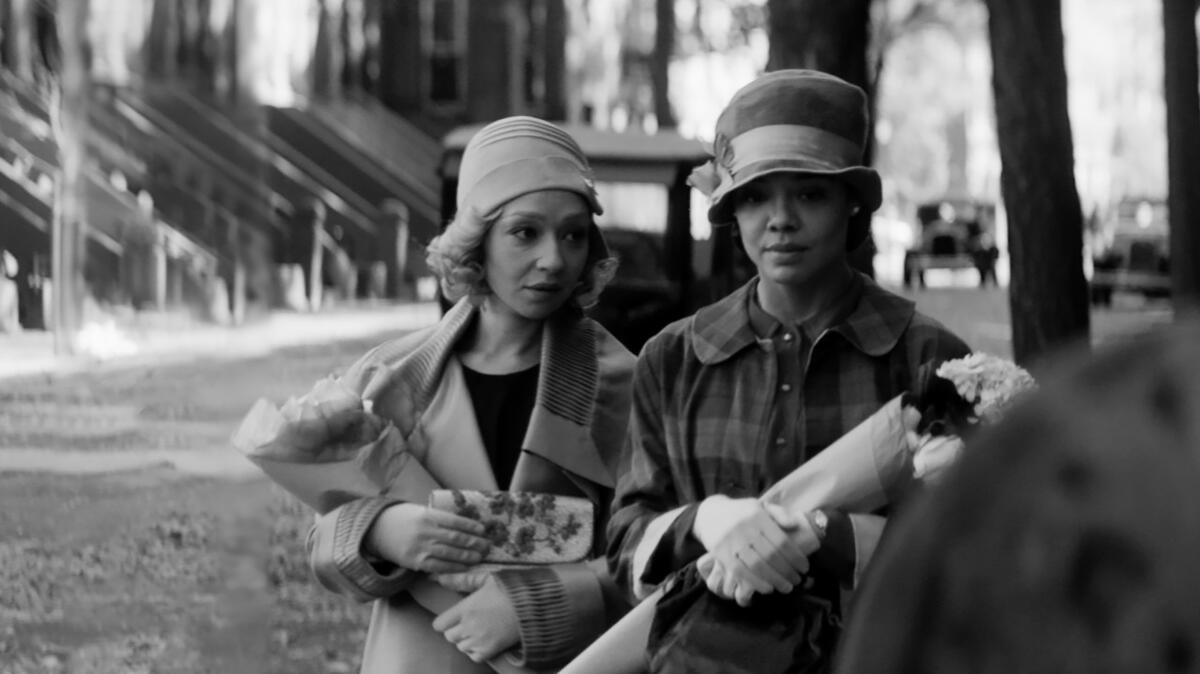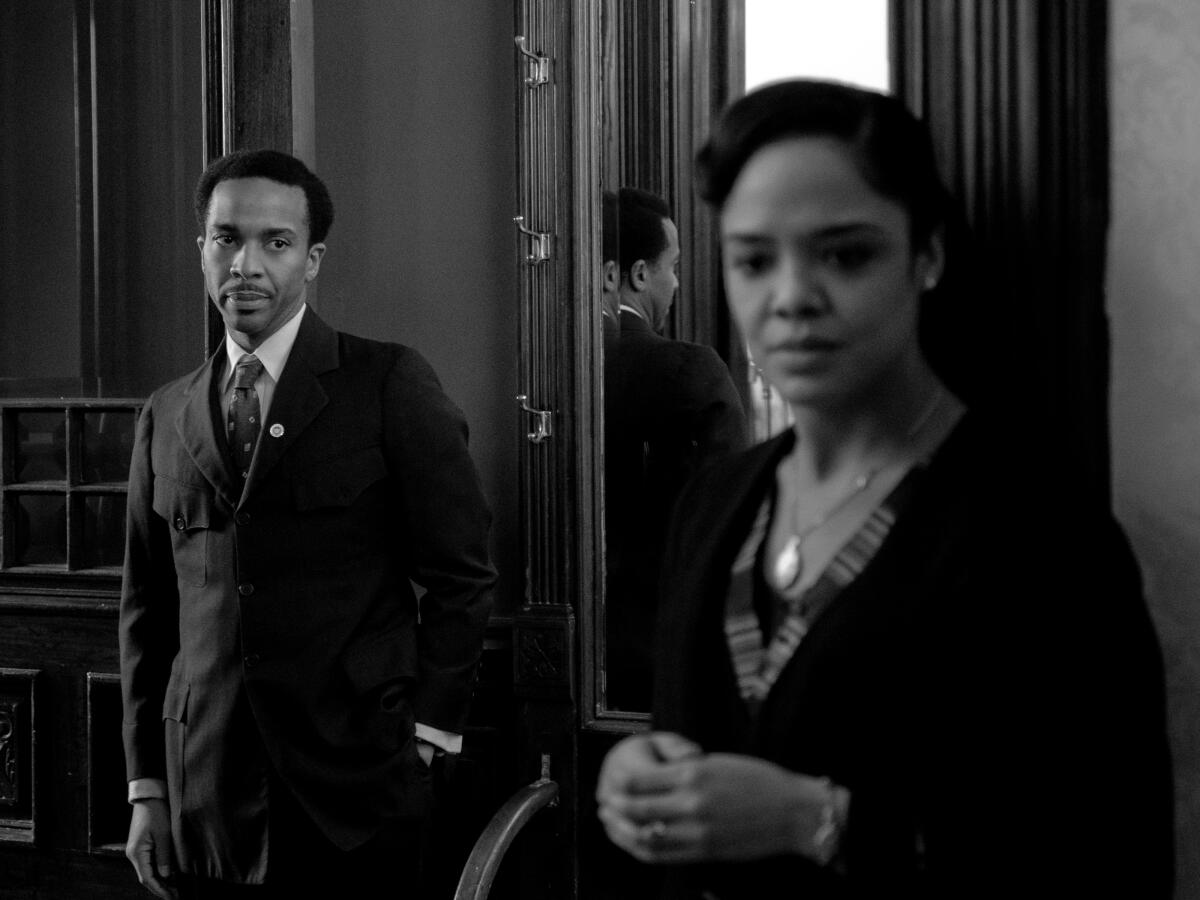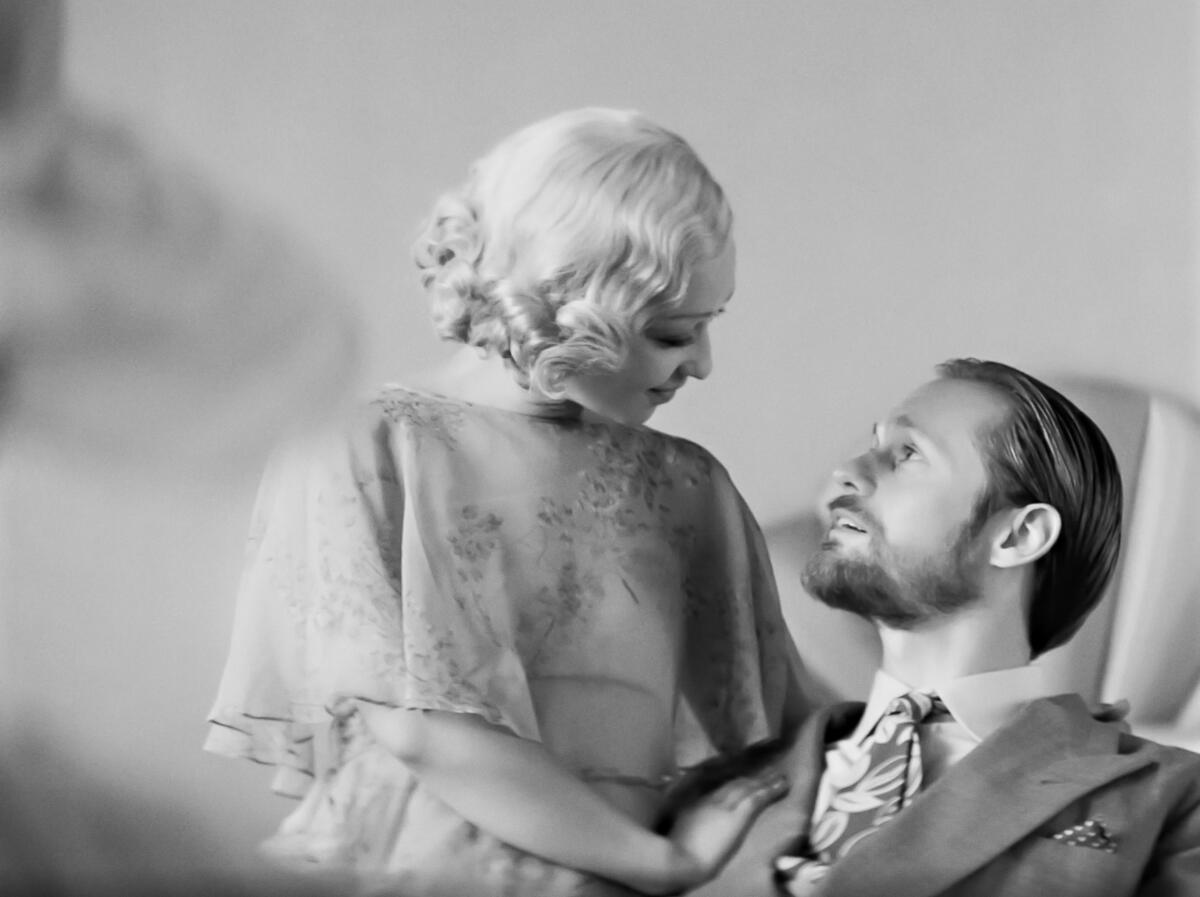Review: Tessa Thompson and Ruth Negga illuminate the beautifully complex drama of ‘Passing’

The Times is committed to reviewing theatrical film releases during the COVID-19 pandemic. Because moviegoing carries risks during this time, we remind readers to follow health and safety guidelines as outlined by the Centers for Disease Control and Prevention and local health officials.
The closing shot of “Passing,” Rebecca Hall’s sleek and transfixing adaptation of Nella Larsen’s 1929 novel, peers down from a great height at a courtyard on a cold December night, a vision partially obscured by falling snow and set to the graceful tinkling of piano chords. The image — composed by Eduard Grau in a nearly square frame and a black-and-white palette — has a hushed, frozen-in-time loveliness that feels faintly unreal. You almost expect the camera to pull back and reveal that this piercingly sad story has been unfolding inside a snow globe, trapping its characters in exquisite clothes, repetitive motions and the slow-shifting mores of a society that has left them scant room to breathe.
That society is 1920s New York, a world that Larsen rendered in deft, economical strokes but which emerges here in a blur of cloche hats and flapper dresses, and also in the blasts of jazz and snatches of gossip swirling around a crowded dance floor.
Against this backdrop — stylishly rendered by the production designer Nora Mendis and the costume designer Marci Rodgers — Irene Redfield (Tessa Thompson) and her doctor husband, Brian (André Holland), are the very picture of Black upper-middle-class propriety. They have two young sons, a stately Harlem brownstone and a stable marriage, though not too stable to be knocked off-balance by Clare Bellew (Ruth Negga), an old friend whose sudden reappearance in Irene’s life dredges up long-hidden anxieties and closely guarded secrets.
The most obvious of these secrets, at least to the audience, is kept by Clare herself, a Black woman who for years has been passing as white. So convincing is this particular imitation of life that when they reunite by chance on a sweltering hot day, Irene doesn’t even recognize Clare, and not just because of her striking blond bob. It has more to do with the dazzling effrontery of her manner — the confidence in her gaze, the notes of Hollywood diva and Southern belle in her voice — as she firmly seizes Irene’s attention and insists that they see each other again soon. It’s not exactly the behavior of someone with something to hide. Or maybe it’s absolutely the behavior of someone with something to hide, knowing the most brazen deceptions are often the most persuasive.

Clare likes to play with fire: She’s concealing the truth from John (Alexander Skarsgård), her very rich, very racist husband and the father of their young daughter (who, to Clare’s relief, was born as light-skinned as she is). But regardless of her fear of exposure, she also longs to recover a sense of kinship, of regular communion with Black women and men like those she grew up with — something that Irene, a pillar of her community, is able yet reluctant to provide. A more obvious (though not necessarily less interesting) version of this story might have sympathetically centered on Clare, perhaps with an eye toward rebuking the “tragic mulatto” stereotypes indulged by the once-popular Hollywood subgenre of passing narratives (many of which, like “Pinky,” “Show Boat” and “I Passed for White,” cast white actors as mixed-race heroines).
But “Passing,” a Netflix-acquired standout of this year’s Sundance Film Festival, has something subtler and more complicated in mind. Hall, closely following Larsen’s text, seems less intrigued by Clare’s motives than by the contradictory feelings they awaken in Irene — a mix of irritation, pity, envy and inescapable curiosity that Thompson illuminates with breathtaking precision. For Irene, Clare’s longing for Black companionship smacks of a kind of twisted exoticism fetish, something Irene muses about with her famous novelist friend, Hugh (a typically strong Bill Camp), in scenes that sparkle with cheeky, conspiratorial wit. At the same time, Irene can’t help but begrudgingly admire and even envy Clare’s self-made status, even if it’s predicated on a troubling and surely unsustainable lie.
But then perhaps that status is, as Clare describes it, “entirely worth the price.” And Irene may agree more than she lets on. She’s no stranger herself to the social advantages of perceived whiteness, as we see in the opening scenes of her shopping for her children and enjoying an afternoon tea, each time scanning the room with a carefully lowered gaze to see if the white clientele take any notice of her (they don’t). And those advantages seem to loom ever larger as she and Clare rekindle their friendship over the next several months. You see Irene’s privilege in the authority she casually wields over her darker-complexioned housemaid, Zulena (Ashley Ware Jenkins), and also in her clashes with Brian (a strong, nuanced Holland), who insists, to her chagrin, on teaching their sons the harsh truths of being a Black man in America.
Clare’s regular presence in the Redfield household has a way of both soothing and inflaming those tensions, and Negga invests her with an elfin glamour that seduces everyone in her orbit, the audience included. At times “Passing” takes on the quality of an infidelity drama in which no infidelity is actually committed and you’re not entirely sure who the potential participants are, given Clare and Brian’s mutual affection and the subtler sparks that occasionally ignite between Clare and Irene. The two women attract and repel each other like emotional magnets; it’s as if their contrasting life decisions have made them soul mates.

Hall, who’s spoken of her own experience as a white-presenting woman of mixed-race ancestry, is as in sync with her two leads as you might expect from an actor of her caliber. (“Passing” is her feature writing-directing debut.) She picks up on their contrasting energies, the way Negga eagerly draws the camera’s gaze while Thompson quietly deflects it. But what’s most striking about Hall’s direction is her visual acuity, her gift for composing images that are gorgeous, disorienting and strangely intuitive. She’ll give us isolated closeups of tense little domestic details — a teapot clutched in both hands, a crack running along a bedroom ceiling — but then pull back to show Irene and Clare strolling freely down an uncrowded street in Harlem. (Their challenges are real, but their decisions, she implies, are theirs.) She’s also fond of blurring the focus in the background of a shot, as if to suggest the limitations of perception.
And those limitations may affect the unsuspecting viewer as well. “We’re all of us passing for something or other, aren’t we?” Irene wonders in one of the script’s few nudge-nudge lines, though it does raise the intriguing possibility that “Passing” might itself be passing for something else. You start to wonder if the movie’s ostensible subject, the complexities and contradictions of racial identity, might in fact be something of a smokescreen — a provocative point of entry into a story rippling with more generalized undercurrents of jealousy, fear and discontent.
The idea is fascinatingly underlined by Grau’s monochrome images, in which stark black-and-white differences are both the whole point and somehow beside the point. “Passing” ends with the shock and sorrow that have been foreshadowed from the beginning, but also with a kind of puzzlement, a sense of disquiet. It’s a beautifully chiseled vision of an uglier world, an artifact of a vanished reality that you’re grateful — and yet strangely reluctant — to leave behind.
'Passing'
Rating: PG-13, for thematic material, some racial slurs and smoking
Running time: 1 hour, 38 minutes
Playing: Starts Oct. 27 at Laemmle Playhouse 7, Pasadena; Los Feliz Theater, Los Feliz; the Landmark, West Los Angeles; Cinépolis Luxury Cinemas, Los Angeles; also available Nov. 10 on Netflix
More to Read
Only good movies
Get the Indie Focus newsletter, Mark Olsen's weekly guide to the world of cinema.
You may occasionally receive promotional content from the Los Angeles Times.











